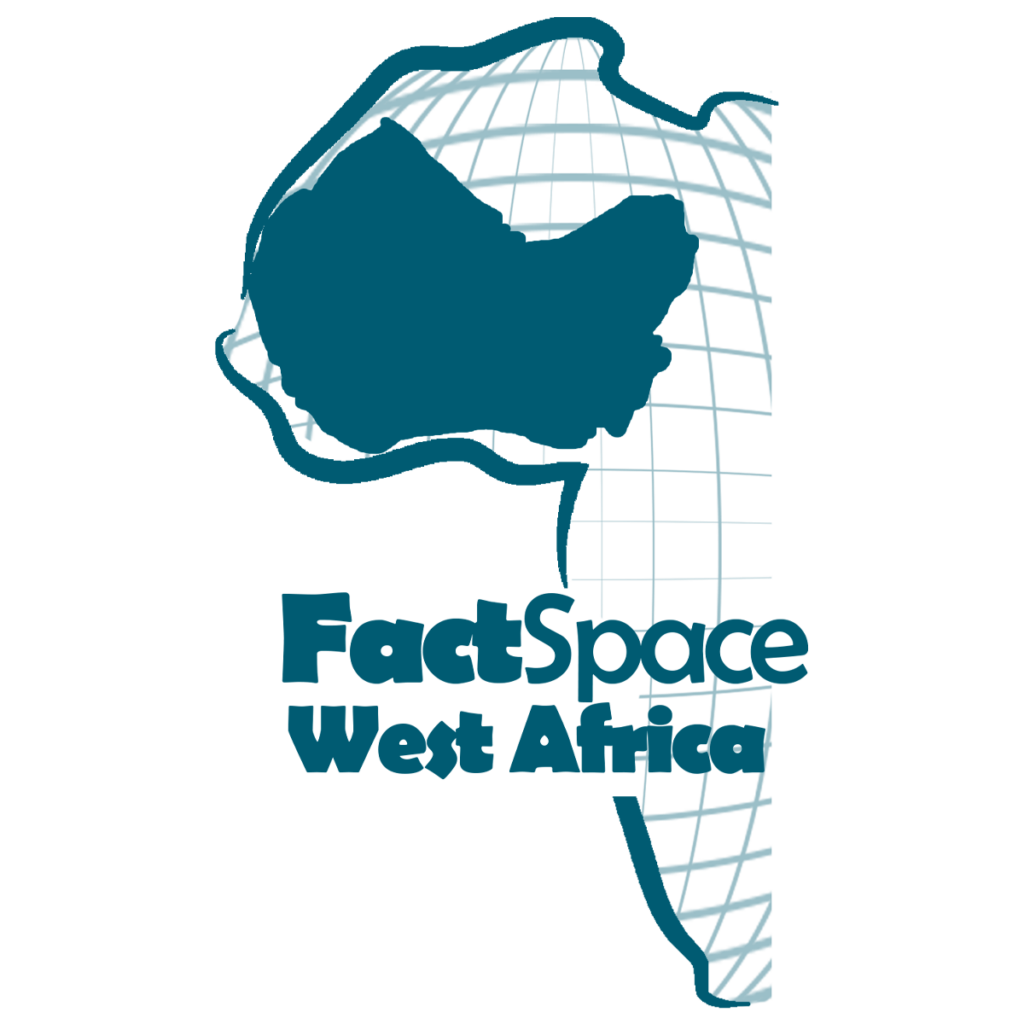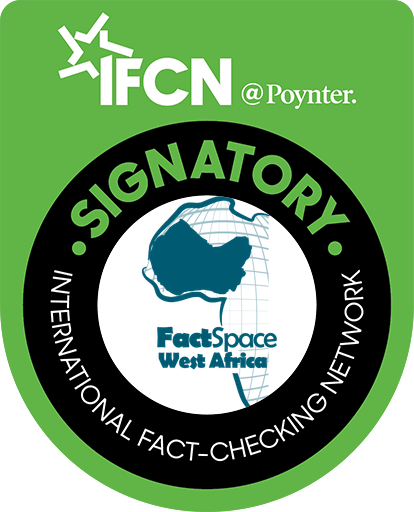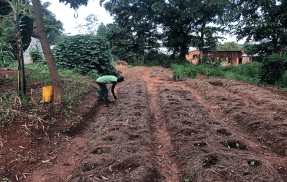
Climate Change is already a reality in Africa.
The continent is experiencing severe drought and its impact on agriculture could lead to food insecurity and affect sustainable livelihoods.
According to the Intergovernmental Panel on Climate Change, Africa is among the most vulnerable continents to Climate Change. But what if Africa could turn to its old ways of practising agriculture to mitigate the effects of Climate Change?
In a remote part of the Mityana district in Uganda, one can locate the Rural Community in Development (RUCID), a 16-acre farm that is being used to preserve nature. Mr Samuel Nyanzi manages this farm and has been doing so for over two decades.
“We grow a variety of crops. We grow coffee, banana, vegetables, mangoes, avocados, cocoa. We also keep poultry, pigs, goats and cattle,” says Mr Nyanzi.
The farm is surrounded by thick trees with sea birds singing as they perch on them. A visitor may mistake it for a forest. However, Mr Nyanzi says it is a deliberate attempt to maintain the natural state of the environment while growing crops and rearing animals on the farm. He describes what he does as Agro-ecology.
“Agro-ecology looks at farming that is animal and crop. But also the micro and macro-organisms; all of them must be one together. For example, each of the organisms which are on the farm should be beneficial to the other. The manure that animals produce actually have to go to the crop so that they become food for the crop. Now the crop residue and the crops go back to the animals. So, you see the cycle.”
At a corner of the farm close to thick trees, a shed serves as the bio-fertilizer factory. Here, micro-organisms collected from the thick forest are mixed with other food waste including coffee shells which then decompose to become bio-fertilizer. Still, at the factory, Mr Nyanzi uses other by-products from the farm to make pesticides to control pests on his farm. Having received training from the Alliance for Food Sovereignty in Africa (AFSA), which is a pioneer organization for bio-fertilizer training of framers in different parts of Africa, he says famers have a lot to benefit from when they turn to agroecology.
“Farmers should consider agroecology because they get food which is not contaminated; I think that is very critical. Because many of the people now, with the conventional way of farming, they eating food which is contaminated and this has caused a lot of diseases. Apart from the food, agroecology balances Climate Change because it has carbon sinking into the soil. Instead of carbon going into the air, it is put back into the soil and is used by the plants,” says Mr Nyanzi.
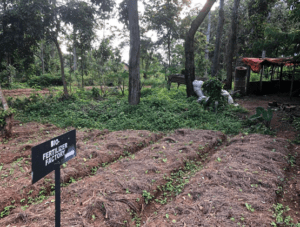
Bio-fertilizer Factory at RUCID, UGANDA
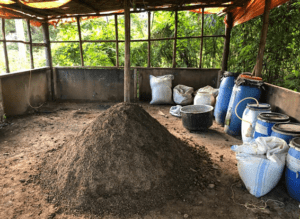
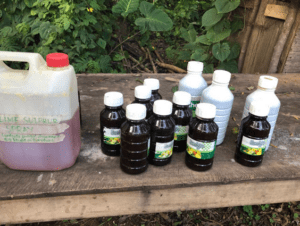
Pesticides made from raw materials from RUCID farm
Despite the benefits of agroecology as experienced by Mr Nyanzi on his farm at RUCID, many farmers in Africa do not practice this type of farming. The shift is towards mechanical and industrial agriculture. In 2018, the Food and Agriculture Organization (FAO) and the African Union (AU) launched a new framework that aims to increase agricultural efficiency and reduce drudgery by helping countries in Africa to develop strategies for sustainable farm mechanization. This was expected to encourage more farmers in Africa to shift from the use of hand tools to the use of tractors and heavy machines to boost agricultural productivity.
However, some researchers believe using such technologies and machines to boost agriculture contribute to high carbon emission, contributing to Climate Change.
“It is crucial and critical to have more awareness; the fact that people are now buying into another model because another model has come in and taken away what they already know. We need to let people know why there are so many health problems; why Climate Change has become more problematic. If we start doing the sensitization, then we start talking about our food varieties that are resilient in terms of Climate Change, which are normally our own varieties because they can adapt to situations around them which a lot of the industry models and solutions don’t,” says Susan Nakacwa, a researcher and programs officer In Uganda working with GRAIN- an international NGO that works to support small farmers.

Susan Nakacwa- Researcher/Programs officer, GRAIN- UGANDA
Meanwhile, the Alliance for Food Sovereignty in Africa is equally concerned that the continent is losing its indigenous seeds owing to the introduction of genetically modified foods.
“We want agriculture policies that speak to the practices that farmers are using; of building the soil, using organic matter; eliminating the use of chemical pesticides and herbicides, eliminating the use of GMO seeds- the hybrid seeds that will only work for one season,” says Bridget Mugambe.
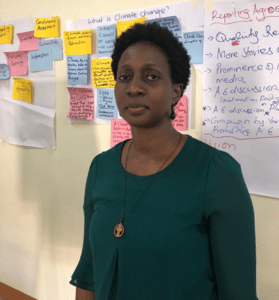
Bridget Mugambe- Program Coordinator, Alliance for Sovereignty in Africa (AFSA)
Back at the RUCID farm, nature is working to Mr Nyanzi’s advantage. He is not only relying on the ecosystem to grow food but also diversifying in the value chain. He produces food and beauty products as well as natural juices from raw materials sourced from his farm. He wants many farmers in Africa to practice agroecology and is leading a campaign by visiting local farmers in Uganda to train and educate them on its benefits. He believes when more farmers go into agroecology, it can help reduce the effects of Climate Change caused by high carbon emissions as a result of mechanized agriculture. Also, they can reduce hunger by growing sustainable food to feed the continent.
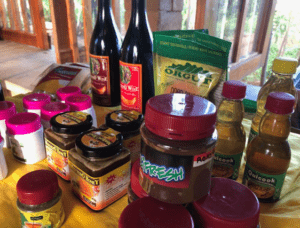
Food products and body creams manufactured by RUCID
By: Nabil Ahmed Rufai
